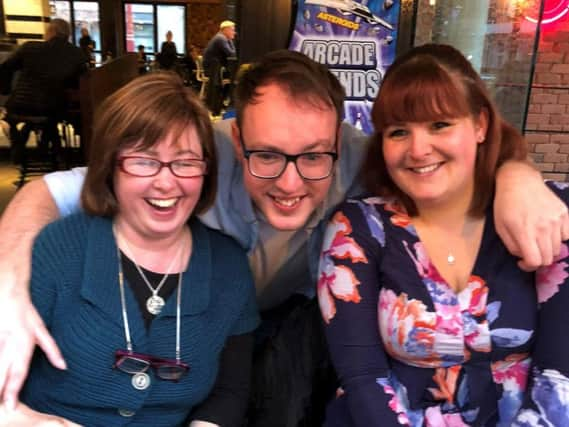Car crash left Burnley man 70% blind - this is how he dealt with it


Three years on, Luke Howarth (30) has said the experience has turned him into a better man. Now he dedicates his life to sharing his inspirational message of hope and determination.
He'd had the world at his feet: he'd been the youngest ever customer service manager at Tesco, Burnley, at just 19-years-old; enjoyed the fast life as a holiday rep in Greece; and worked in a ski resort as an accountant, before starting a degree in accountancy.
Advertisement
Hide AdAdvertisement
Hide AdBut it all came to a stop when he suffered a stroke during a car crash, and was left both blind and unable to use his right arm.
He said: "I went from being very busy and working six days a week to being home on my own and having nothing to do.
"I had a lot of emotional baggage to deal with. I always say the aftermath of losing my sight was an emotional roller-coaster. You have both ups and downs."
In hospital, he was taught how to use an iPad to complete tasks without his sight. He had to learn to do everything differently, even making brews.
Advertisement
Hide AdAdvertisement
Hide Ad"They say losing your sight is like losing someone you're close to - you go through a grieving process, and I did, but 1000 times worse," he said.
"I remember throwing an iPad across the hospital ward because I was so angry and frustrated. It was difficult learning to do things in new ways using my other senses.
"The toughest bit was battling through the emotional side - a mix of anger, depression and resentment. It can hit you even more if you're not used to dealing with those kinds of feelings.
"That's why you should never take for granted that something bad could happen to you. Life can change in the blink of an eye."
Advertisement
Hide AdAdvertisement
Hide AdLuke was forced to adapt his home, as he could only see objects in highly contrasting colours. He bought a red kettle, for example, so he could see it against his black kitchen, and put special bumper stickers on his washing machine and microwave to help him navigate the settings.
He also has an iPad and computer which talk back to him and he underwent long cane training through Lancashire County Council to help him travel safely.
"I've had to find my way around everything but doing that made me realise I can still live my life to the full," he said.
"Technology right now is amazing and makes things so accessible, and my others senses have become stronger.
Advertisement
Hide AdAdvertisement
Hide Ad"My friends have called me a really strong person. To me, there are no barriers - you've just got to get through the hard emotions."
Now he uses his strength to help others cope with blindness: he gives motivational speeches all over the region and has a job with charity Sight Line, in which he coordinates volunteers.
Luke travels up and down the North-West for his job, thanks to a programme called Access to Work, which provides a support worker who drives him anywhere he needs to go.
"I forgot what I had to offer and by talking, networking and giving motivational speeches, I rediscovered it," he said.
"It was so rewarding.
Advertisement
Hide AdAdvertisement
Hide Ad"You think your life is over but that's just not the case - I can still do anything."
Luke is proving some attitudes towards blind people - that they cannot, for example, socialise, hold down a job or watch TV - are outdated and incorrect.
"People don't always understand blindness," he said. "They think you can't see anything but that's not usually the case - only 3% of people who are registered visually impaired don't have any sight."
Luke even appeared on TV show, Who Dares Wins, and dared himself to go back to Greece, where he spent the evenings singing karaoke or playing quizzes and Chinese Bingo.
Advertisement
Hide AdAdvertisement
Hide AdAnd in September he braved a sky dive in Cumbria in aid of blindness charity Royal National Institute of Blind People (RNIB).
"A key thing is to find something which interests you," he said, "and remember, there are people out there who've been through it too. You're not alone.
"It was importance for me to have a group of friends who understand what I'm going through, so I have someone to relate to. Two of my best friends are visually impaired.
"People deal with trials and tribulations differently but in a group like this you can impart wisdom. It's the best thing, because it gives you purpose, and a focus for other people.
Advertisement
Hide AdAdvertisement
Hide Ad"There is lots of support out there, so access the information. It does get better and your life can be fulfilling and rewarding.
"I feel like I'm a better person now than before the crash, as I can emphasise more with people.
"I'm glad to be the person I've become."
For more information about blindness and available services, please visit https://www.rnib.org.uk/ or https://www.sightline.org.uk/